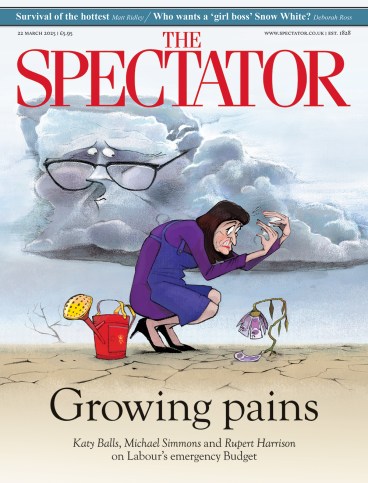
Almost every nation has a national poet. The Russians have Pushkin. The Persians have Ferdowsi. The Albanians have Gjergj Fishta. But it would be a very odd thing if any of these peoples had their national poet taken away from them or were forced to have their national poet insulted. Indeed, it might be considered rather bad form if someone told the Russians that the author of Eugene Onegin should be held accountable for the era of serfdom. Or told the Persians that the author of the ‘Shahnameh’ should be as nought because his era did not have all our views on gay marriage.
Yet the English. Ah – the English. We are allowed to be treated with a unique type of disrespect. And so naturally that disrespect can even be levelled at our national poet.
This reflection follows the news this week that Stratford-upon-Avon is to be ‘decolonised’. The impetus for this modern vandalism comes from ‘concerns’ that the birthplace of Shakespeare could be used to promote ‘white supremacy’.
Why Stratford-upon-Avon should be seen to be a wellspring of this great bogeyman of our age is slightly unclear. The Shakespeare Birthplace Trust owns a number of buildings associated with the playwright. Its archives include parish records relating to his birth and baptism. But now a research project between the Trust and someone called Dr Helen Hopkins, of the University of Birmingham, has agreed that the Trust must be ‘decolonised’.
For anyone lucky enough not to have come across this pseudo-academic term, ‘decolonisation’ pretends to consist of an effort to ‘move away from western perspectives’. Again it is worth pointing out how absurd, as well as one-sided, such efforts are. Nobody would say that Ferdowsi must be taken away from his eastern perspectives, or that Pushkin should be removed from his Russian perspectives. But when it comes to taking western writers away from their ‘western perspectives’? There lies one of the great academic boondoggles of our time.
The ostensible aim in Stratford-upon-Avon is to ‘create a more inclusive museum experience’, to explore ‘the continued impact of Empire’ and ‘colonialism’ on the collection and to reveal how ‘Shakespeare’s work has played a part in this’. In an act of self-harm that would be admired by a samurai warrior, the Shakespeare’s Birthplace Trust has said that some items in its collections and archives might contain ‘language or depictions that are racist, sexist, homophobic, or otherwise harmful’.
I should hope so. I for one am not keen that every item in every archive in the world should conform to the boring shibboleths of our time. If I were to look at an archive from the 16th and 17th centuries I would be disappointed if I found works which could have been written by a DEI committee in 2020.
But our era is what it is – all its idiotic presumptuousness included. And at risk of citing Italy’s national poet and stirring up a whole other hornet’s nest of white supremacy, let me repeat a previous observation of mine about our era: that when it comes to our ignorance there is always another circle to this inferno. On this occasion that extra layer of hell comes from the fact that Dr Hopkins and the Shakespeare Trust have a problem with the idea – presented at Stratford – that Shakespeare is in some way a ‘universal’ genius.
There are ‘concerns’ that the birthplace of Shakespeare could be used to promote ‘white supremacy’
Readers might notice an interesting dilemma here. Because if these are the rules then Shakespeare and the English are rather stuck, aren’t we? On the one hand Shakespeare’s birthplace might present England’s national poet as ours and ours alone. It might present a view of his life and works which could be summed up by signs at Stratford saying: ‘Bog off, foreigners. Shakespeare is ours, and we better not find your mucky foreign fingers on him.’ That would probably stir the ire of a few second-rate academics.
As it happens, the claim that Shakespeare is not only ours, but also in fact the possession of the whole world is also a crime. This set-up would appear to put the nation’s heritage and the legacy of our national poet in the position that chess players inform me is known as ‘zugzwang’: where you have to move but where every possible move will only make your position worse. Say that Shakespeare is English and you lose. Say that he is universal and you lose. It is almost as though this game is rigged, isn’t it?
And so the project being foisted upon Stratford argues that the claim that Shakespeare is one of the ‘greatest’ writers is itself white supremacist and must be challenged. The suggestion that Shakespeare presents any kind of pinnacle of world culture must also be removed because it is apparently ‘western centric’. One of the only practical suggestions for how to solve this is to make the collection more ‘universal’. So far this effort has included events at Stratford celebrating the works of the great Bengali poet Rabindranath Tagore and a Bollywood-themed dance class.

To belabour a point, I should think it rather odd if academics went to Rabindranath Tagore’s birthplace and said it needed a bit more Shakespeare in the mix. As it would be likewise strange to go to the home of Bollywood and note that the place was rather lacking in morris dancers. But of course that would not be done. Because that way around would be deemed ‘colonialist’. What, then, is this process that is being forced upon us? ‘Anti-colonialist’? For how long?
Not for the first time I am forced to wonder about the ideas being pushed upon our culture – including the idea that the pinnacles of human achievement are no pinnacles if they come from us.
Fortunately we have the Bard to guide us. And so I can confidently say that Shakespeare is to Dr Hopkins and the Shakespeare’s Birthplace Trust as Hyperion to a satyr. They should look it up.









Comments